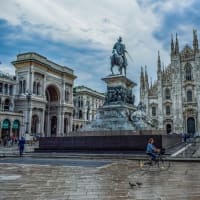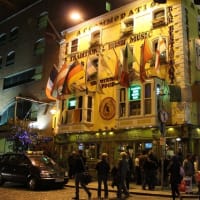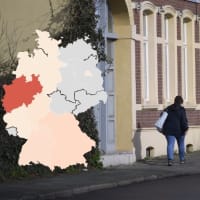2020年1月7日(Tue.) 明日にかけて日本を冬の嵐が襲うようです。気を付けて下さい。
*
さて、宗教行事に関する話題ではありますが、多文化共生の意味も含めて知っておいたほうが良い内容だと思います。(ニュースソース: DWーDE 1月6日発 )
<原文の一部>
In pictures: How people celebrate January 6 around the world
January 6 is a special day for many in the Orthodox Church. But not all traditions on this day are religious.
(抜粋)1月6日は、ギリシア正教会(the Orthodox Church)の多くにとっては特別な日になります。しかし、今日のそれは、全てが宗教的かと言うと、そうでもありません。(意訳)

Epiphany carol singers(公現日の賛美歌隊: 意訳)
Epiphany is a Christian feast celebrated on January 6 to commemorate the visit of the Magi to baby Jesus. In Germany, children dress up as the Three Kings and go from door to door singing carols and asking for donations to Catholic Church projects. In return, they write blessings on the door with chalk.
(抜粋)1月6日は公現日、ドイツでは、子供達が3賢王に扮して各家を廻り、聖歌を歌い寄付を募ります。そのお礼として、ドアにチョークで祝福のメッセージを書きます。

French 'King's Cake'
"Galette des Rois" — puff pastry stuffed with frangipane — is eaten across France on January 6 as part of a tradition that goes back hundreds of years. Each cake contains a small trinket or bean; the person who finds it is pronounced "king" for the day.
(抜粋)フランスでは、このケーキを1月6日に食べます。(原文を参照下さい。)

'Of de Werser geiht or steiht'
Not all traditions on this day are religious. In Germany, the Bremen "Ice-bet" or "Eiswette" began in 1828 when merchants bet on whether the Weser river would be frozen in January 1829: in local dialect, "of de Werser geiht or steiht." At midday a man dressed as a tailor checks with an iron whether the river is frozen . The Weser has not frozen over since 1947, but the tradition continues.
(抜粋)ドイツのブレーメンでは、1828年から始まったアイスベット(賭け)があります。これは商人達がヴェザー川が1829年の1月に凍るかどうかを賭けたものです。(注: 手にしているのはアイロンで、これで凍っているかどうかを調べるのです。)ちなみに、1947年以来、ヴェザー川は凍ったことがありませんが、この伝統行事は続けられています。

Brrrrrrulgaria
Orthodox Christians in the town of Kalofer, Bulgaria, celebrate the religious festival of Epiphany by diving into freezing water to retrieve a wooden crucifix. By tradition, the person who fetches the cross will be freed from evil spirits and healthy throughout the year. After the cross is fished out, the priest sprinkles believers with water using a bunch of basil.
(抜粋)ブルガリア(ブルルル・・・)
ギリシア正教会として祝う行事で、凍てつく川に飛び込み、十字架を救います。(注: 原文を参照下さい。)

Old Christmas Day
Orthodox Christians use the Julian calendar rather than the Gregorian calendar, which much of Europe adopted in or before 1752. This means that Christmas Day falls on either January 6 or 7, not on December 25; for this reason, it is known as "Old Christmas day." Many Orthodox Christians fast in the time leading up to Christmas, restricting their diet for up to 40 days before the day comes.
(抜粋)昔のクリスマスの日
昔は、1月の6日か7日がクリスマスとして扱われていました。12月25日ではありませんでした。(注: 原文を参照下さい。)

Celebrations in Bethlehem
In the occupied West Bank town of Bethlehem, Jerusalem's Greek Orthodox Patriarch Theophilos III arrives at the Church of the Nativity to celebrate the Christmas Mass with his community. The biblical birthplace of Jesus now has a Muslim majority, but a significant Palestinian Christian community lives there as well.
(抜粋)ベツレヘムでの祝い行事(注: 和訳省略)

Time to take down the tree
People who celebrate Christmas using the newer Gregorian calendar traditionally take down their decorations on January 6. It is considered bad luck if they are left up beyond this date.
(抜粋)クリスマスツリーの片付け
この日を越えて飾っておくのは好ましくないと考えられています。
***
原文をサラリと流し読みすると大凡は理解出来るかと思います。何れにしても、宗教に関しては、互いに寛容性を持って接したいものですね。
*
それにしても、2013年のドイツ滞在時には、幾度かヴェザー川に近寄っています。ブレーメンもそうですが、ハーメルン(笛吹き男の)やミンデンでも・・・。
*** 下の写真は、記事内容とは関係ありません。

***
*
さて、宗教行事に関する話題ではありますが、多文化共生の意味も含めて知っておいたほうが良い内容だと思います。(ニュースソース: DWーDE 1月6日発 )
<原文の一部>
In pictures: How people celebrate January 6 around the world
January 6 is a special day for many in the Orthodox Church. But not all traditions on this day are religious.
(抜粋)1月6日は、ギリシア正教会(the Orthodox Church)の多くにとっては特別な日になります。しかし、今日のそれは、全てが宗教的かと言うと、そうでもありません。(意訳)

Epiphany carol singers(公現日の賛美歌隊: 意訳)
Epiphany is a Christian feast celebrated on January 6 to commemorate the visit of the Magi to baby Jesus. In Germany, children dress up as the Three Kings and go from door to door singing carols and asking for donations to Catholic Church projects. In return, they write blessings on the door with chalk.
(抜粋)1月6日は公現日、ドイツでは、子供達が3賢王に扮して各家を廻り、聖歌を歌い寄付を募ります。そのお礼として、ドアにチョークで祝福のメッセージを書きます。

French 'King's Cake'
"Galette des Rois" — puff pastry stuffed with frangipane — is eaten across France on January 6 as part of a tradition that goes back hundreds of years. Each cake contains a small trinket or bean; the person who finds it is pronounced "king" for the day.
(抜粋)フランスでは、このケーキを1月6日に食べます。(原文を参照下さい。)

'Of de Werser geiht or steiht'
Not all traditions on this day are religious. In Germany, the Bremen "Ice-bet" or "Eiswette" began in 1828 when merchants bet on whether the Weser river would be frozen in January 1829: in local dialect, "of de Werser geiht or steiht." At midday a man dressed as a tailor checks with an iron whether the river is frozen . The Weser has not frozen over since 1947, but the tradition continues.
(抜粋)ドイツのブレーメンでは、1828年から始まったアイスベット(賭け)があります。これは商人達がヴェザー川が1829年の1月に凍るかどうかを賭けたものです。(注: 手にしているのはアイロンで、これで凍っているかどうかを調べるのです。)ちなみに、1947年以来、ヴェザー川は凍ったことがありませんが、この伝統行事は続けられています。

Brrrrrrulgaria
Orthodox Christians in the town of Kalofer, Bulgaria, celebrate the religious festival of Epiphany by diving into freezing water to retrieve a wooden crucifix. By tradition, the person who fetches the cross will be freed from evil spirits and healthy throughout the year. After the cross is fished out, the priest sprinkles believers with water using a bunch of basil.
(抜粋)ブルガリア(ブルルル・・・)
ギリシア正教会として祝う行事で、凍てつく川に飛び込み、十字架を救います。(注: 原文を参照下さい。)

Old Christmas Day
Orthodox Christians use the Julian calendar rather than the Gregorian calendar, which much of Europe adopted in or before 1752. This means that Christmas Day falls on either January 6 or 7, not on December 25; for this reason, it is known as "Old Christmas day." Many Orthodox Christians fast in the time leading up to Christmas, restricting their diet for up to 40 days before the day comes.
(抜粋)昔のクリスマスの日
昔は、1月の6日か7日がクリスマスとして扱われていました。12月25日ではありませんでした。(注: 原文を参照下さい。)

Celebrations in Bethlehem
In the occupied West Bank town of Bethlehem, Jerusalem's Greek Orthodox Patriarch Theophilos III arrives at the Church of the Nativity to celebrate the Christmas Mass with his community. The biblical birthplace of Jesus now has a Muslim majority, but a significant Palestinian Christian community lives there as well.
(抜粋)ベツレヘムでの祝い行事(注: 和訳省略)

Time to take down the tree
People who celebrate Christmas using the newer Gregorian calendar traditionally take down their decorations on January 6. It is considered bad luck if they are left up beyond this date.
(抜粋)クリスマスツリーの片付け
この日を越えて飾っておくのは好ましくないと考えられています。
***
原文をサラリと流し読みすると大凡は理解出来るかと思います。何れにしても、宗教に関しては、互いに寛容性を持って接したいものですね。
*
それにしても、2013年のドイツ滞在時には、幾度かヴェザー川に近寄っています。ブレーメンもそうですが、ハーメルン(笛吹き男の)やミンデンでも・・・。
*** 下の写真は、記事内容とは関係ありません。

***




















※コメント投稿者のブログIDはブログ作成者のみに通知されます